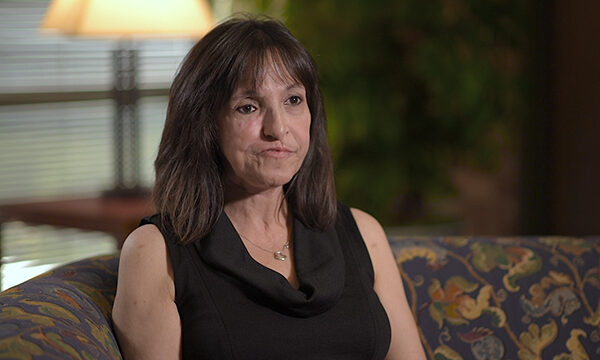Seven years after surgery, oral cancer patient is cancer-free
Denise Matteo didn’t think twice about the broken tooth that caused her to see her dentist. “He looked at it and recommended $13,000 worth of dental work,” she…

Update your location to show providers, locations, and services closest to you.
Oral cancer includes cancer of the lips, tongue, mouth, gums, salivary glands and oropharynx (throat). The National Cancer Institute estimated that there would be about 54,000 new cases of oral cancer diagnosed in 2022 in the United States. Of these, men are diagnosed two times more frequently than women.

The main risk factors associated with oral cancer are smoking — cigarettes, cigars, pipe and smokeless tobacco — and alcohol consumption. The five-year survival rate for patients with oral cancer has not significantly improved over the past three decades, with the mean survival of approximately 55%. This poor survival rate is attributed to the late diagnosis in the majority of patients.
The diagnosis is made by performing an incisional biopsy to get a small sample of the lesion and submitting it to the pathologist for review.
Patients receive an injection with local anesthesia before the biopsy is performed. The patient may experience slight discomfort after the procedure, which is usually relieved with over-the-counter pain medication.
After the biopsy, the workup consists of a complete head and neck physical exam and a CT scan of the neck to determine if the cancer has spread to the lymph nodes. A chest X-ray is also obtained along with blood work.
The most common treatment for oral cancer is surgery. Surgery involves the removal of the cancer in the mouth, as well as a neck dissection (removal of lymphatic tissues of the neck along with their associated fat). A neck dissection is performed for one of two reasons:
Surgery alone may be sufficient treatment; however, patients may be referred for radiation therapy or chemotherapy to ensure the cancer is eradicated. The typical hospitalization for these surgeries may be as short as a couple of days.
One of the major advances in the care of oral cancer patients has been in the area of reconstruction. The gold standard at most major cancer centers is the reconstruction of complex defects with microvascular reconstructive techniques.
Microvascular free flaps involve the transfer of distant skin, muscle and/or bone with their own blood vessels to reconstruct (recreate) the missing structures. This is a specialized and technically sophisticated surgery that allows patients to have improved function and a post-surgery appearance that may not be significantly changed from before the surgery.

The UF Health Jacksonville cancer program is accredited by the Commission on Cancer, a quality program of the American College of Surgeons.






Our community and patient programs provide great value to patients, families and loved ones. People can find support, educational materials, expert consultants and more. In most instances, these programs are offered free of charge.
Meeting the emotional, physical and humanistic needs of oral and head and neck cancer patients and their caregivers.
Denise Matteo didn’t think twice about the broken tooth that caused her to see her dentist. “He looked at it and recommended $13,000 worth of dental work,” she…

Retired nurse Susan Lloyd was diagnosed with stage 4 oral cancer in 2013. “It all started with a sharp pain in my jaw that made it painful to eat,” she said.…
